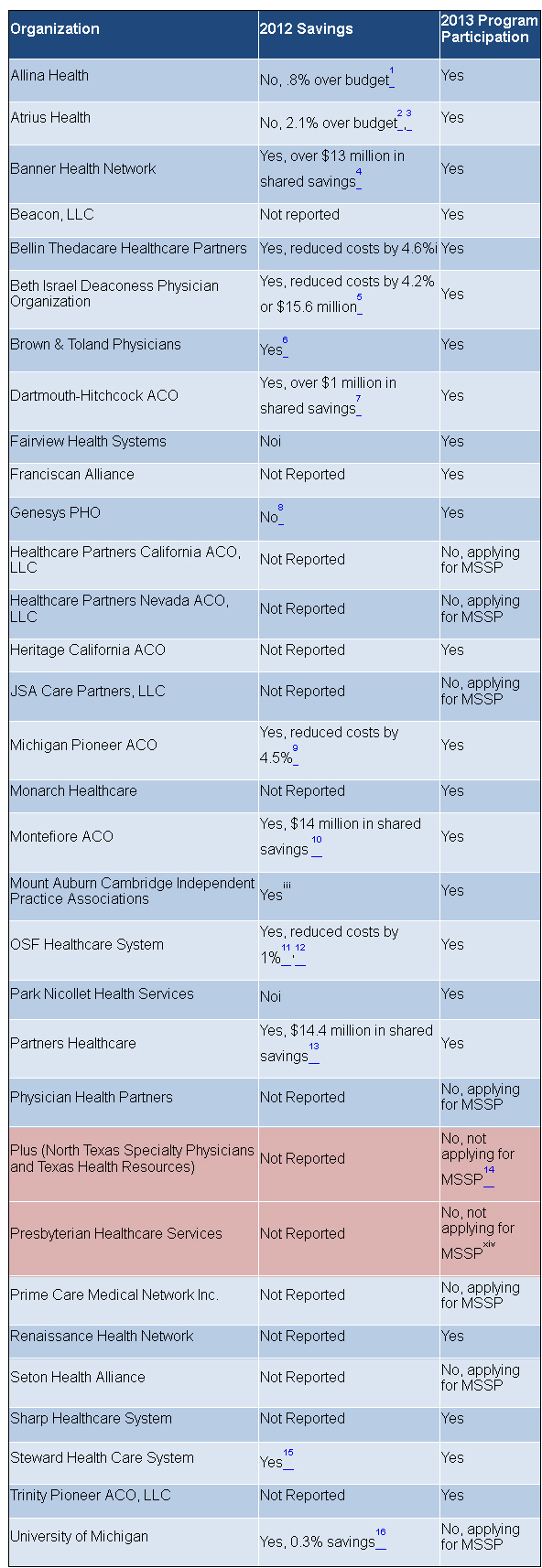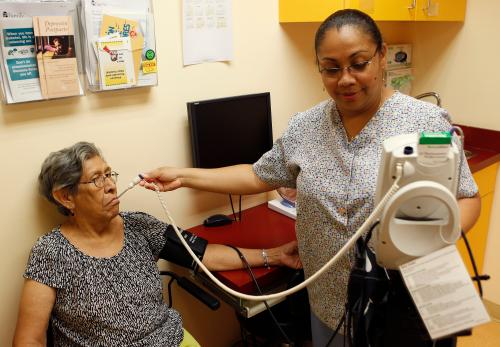The first year experience of 32 Medicare “Pioneer” Accountable Care Organizations (ACOs) suggest five key conclusions, based on the initial results recently released by CMS and information from the participants. First, the ACO concept remains attractive, with 30 of the 32 Pioneers continuing as Medicare ACOs. Second, all Pioneer ACOs delivered high quality care, outperforming industry benchmarks.
Third, 13 (or 40 percent) of the Pioneers had sufficiently strong financial performance to qualify for shared savings bonus payments. Fourth, lowering costs and improving quality does not come easily, requiring both continuing hard work and significant investment. Finally, enabling ACOs to achieve ongoing success may require modifying current rules.
Continuing Strong Interest in the ACO Model
Two years ago, the CMS Innovation Center chose 32 Pioneer ACOs based on the proven track record and capacity of each organization. The selected Pioneers also had demonstrated a commitment to improving quality, lowering costs, and moving fee-for-service Medicare from a siloed to a more coordinated, patient-centered model of care. Based on the first year of experience, 23 of the 32 Pioneers are continuing in the program. Only 2 organizations have terminated being Medicare ACOs, while 7 shifted from the advanced Pioneer program (in which they must assume “downside” risk for losses) to the more financially forgiving “regular” Medicare Shared Savings Program which permits one-sided (bonus-only) financial arrangements. Table I reports the status of each of the 32 Pioneer ACOs.
In addition to the 23 renewing Pioneer ACOs, CMS previously contracted with 220 ACOs under the regular MSSP rules, plus the 7 ACOs converting from the Pioneer program. Reports suggest that CMS has received many applications for the next round of new ACO contracts scheduled for January, 2014.
Hospitals, physician groups and other organizations are reported as of March 2013 to have created 449 ACOs (or ACO-like entities) as an alternative to traditional fee-for-service and a promising strategy to shift from volume based payment to a value based model. Although reliable information remains limited, some private sector ACOs appear to be producing positive results, in part because they have directly engaged providers to redesign workflows and improve care coordination at a population level.
Quality
All 32 Pioneer ACOs outperformed industry benchmarks on 15 quality measures such as blood pressure control as well as lipid management in adult diabetics. These first year results should help alleviate concerns that the shared savings methodology would cause providers to “stint” on necessary care and undermine quality.
Earlier this year, the 32 Pioneers publicly challenged the benchmarks CMS had proposed for 19 of the quality measures, objecting that flat percentage benchmarks were not accurate and lacked “anchoring methodology.” (The final rule contains 33 individual quality measures, grouped into four key domains: Patient Experience of Care, Care Coordination/Patient Safety, Preventive Health, and At-Risk Population. Seven of the measures had no comparable data in the published literature.) In addition, some Pioneer ACOs also expressed concerns that the aggregation of certain measures was flawed.
Although CMS refused the Pioneers’ request to delay tying payment to results in the second contract year, CMS has agreed not to use its previously proposed flat percentages, instead setting thresholds based on performance data from the Pioneers as well as organizations submitting data on the 19 measures through the Physician Quality Reporting System (PQRS).
Financial Performance
CMS reports Pioneer ACOs achieved lower cost growth (0.3 percent) for their 669,000 beneficiaries than the growth observed (0.8 percent)for similar beneficiaries in fee-for-service during the same period. Of the 32 Pioneers, 18 achieved below budget spending, but 5 of the 18 saved less than the threshold used to exclude normal statistical variation. As a result, these 5 Pioneers did not qualify for shared savings despite having below-target spending. In contrast, the 13 Pioneers with significant savings generated gross savings of $87.6 million in 2012. Medicare netted nearly $33 million as the Trust Fund share of the ACO savings. Reduced hospital admissions and readmissions were reportedly principal drivers of overall cost savings.
In contrast to the 18 Pioneers that achieved below budget spending, the remaining 14 Pioneer ACOs experienced above budget spending. Of the 14 Pioneer ACOs, 12 of them were within the threshold established to exclude normal statistical variation. As a result, only two Pioneers had statistically significant losses, totaling $4.5 million. Reports have identified Atrius as one of the two entities with significant losses, but the other is unknown.
Arguably, the Pioneers constitute the most likely entities to succeed as ACOs. While 56 percent (18) performed better than budget, 41 percent (13) performed sufficiently better than target to receive bonus payments. Only 6 percent (2) of the Pioneer ACOs actually incurred sufficiently large losses to trigger repayment to CMS. However, all the Pioneers incurred significant expenses to operate as a coordinated care entity and improve quality. As a result, the majority of Pioneer ACOs most likely have failed to breakeven financially at this point.
Difficult Challenges for ACOs
The human and financial investments needed to improve quality and lower costs are clearly quite significant. The jury is still out on whether even successful ACOs can achieve sufficient savings to cover their operating costs, finance the costs of clinical transformation, and meaningfully reward providers. Clearly, to be viable over time, ACOs will require a positive return on investment.
Complicating the financial outlook, successful ACOs will face a rebasing of their costs after the initial 3-year contract. To the extent that ACOs significantly drive down their costs (as required to realize shared savings), those savings will lower its 2015—2017 budget targets. In other words, once an ACO achieves savings, it will need to find new savings to generate future bonus payments. For entities that started with efficient utilization patterns, it is an open question whether they can continuously achieve added savings.
Initial reports suggest that many ACOs have experienced significant “leakage” above and beyond predictions, whereby patients use non-ACO providers and, potentially, receive unnecessary services. By statute, Medicare ACOs have very limited tools to influence beneficiary utilization. Current rules prohibit Medicare ACOs from limiting beneficiary choice or having financial incentives (such as higher cost sharing for non-ACO services). Similarly, current attribution rules markedly limit beneficiary engagement, which many view as a significant constraint on the ability of ACOs to improve clinical and financial performance.
As previously discussed, concerns about quality include aggregation methods and how to empirically establish meaningful thresholds. While many private payers have reportedly adopted some of these measures in their own ACO programs, it will be vital to harmonize measures across payers. All payers (including CMS) appear intent on growing the number of required measures over time, which may undermine maintaining a sustained focus and unintentionally cause the “better” to be the enemy of the “good”.
Learning from Initial Results: The Path Forward
A recent Health Affairs article and the April report of the Bipartisan Policy Center describe similar approaches to changing current Medicare Shared Savings Program rules to create enhanced ACOs. Key features that would address concerns that are emerging from the initial Pioneer results include actively engaging beneficiaries and providing ACOs with more tools to coordinate care and influence beneficiary behavior.
As discussed, quality measures must improve, so that they are better coordinated across payers, thresholds are appropriately anchored (and represent a realistic assessment of current practice and not a prohibitive set of aspirational goals), and the number of and burden associated with measures avoids either losing focus on sustainable clinical (and patient experience) improvement or creating a set of standards that are too expensive to be met.
Finally, an alternative method for setting appropriate budgets needs to be developed. Over time, continuously requiring new savings (as previously achieved savings are incorporated into the rebased targets) will undermine ACOs, with the most successful ACOs “hitting the wall” fastest.
Table I: Pioneer ACO Program Participation and Reported Savings

Note: Reliable information was not found for those listed as “not reported.”
Notes for Table:
1. J. Crosby, J. Spencer. “Lower costs elude hospitals.” Star Tribune [Minneapolis] 17 July 2013.
2. M. Evans. “Why one Medicare Pioneer ACO failed to save money.” Modern Healthcare. 16 July 2013.
3. L. Kowalczyk. “Four of Five Mass. Pioneer ACOs cut medical spending last year by better coordinating care.” Boston Globe. 17 July 2013.
4. “Banner Health Network delivers quality care at a lower cost in the Medicare Pioneer model’s first year.” Banner Health. 16 July 2013.
5. J. Berger. “Beth Israel Deaconess Care Organization Pioneer ACO Among Top Performers Nationally In First Year Results.” Beth Israel Deaconess Medical Center. 16 July 2013.
6. R. Angeloni. “Brown & Toland Physicians’ Participation in Pioneer ACO Helps Generate Savings for Medicare.” Brown & Toland. 16 July 2013.
7. R. Abrams. “Dartmouth-Hitchcock Shows Savings, Meets Quality Measures in First Year of Pioneer ACO Program.” Dartmouth-Hitchcock. 17 July 2013.
8. R. Erb. “U-M system pulls out of ACO health care program.” Detroit Free Press. 17 July 2013.
9. “Detroit Medical Center Successfully Completes First Year Using ACO Model!” Detroit Medical Center. 16 July 2013.
10. “Montefiore Pioneer ACO Model Achieves Success in First Year.” Montefiore. 17 July 2013.
11. “OSF HealthCare Recognized by CMS for Pioneer ACO Work.” OSF HealthCare. 16 July 2013.
12. “OSF HealthCare Recognized by CMS for its Pioneer ACO Work.” 16 July 2013. WIFR.
13. “Partners HealthCare slows cost growth, improves quality.” Partners Media Center. 16 July 2013.
14. J. Zigmond. “CMS names ACOs leaving Pioneer program.” Modern Healthcare. 16 July 2013.
15. J.M. Donnelly. “Mass. has winners and lowers in Medicare ACO project.” Boston Business Journal. 16 July 2013.
16. “Success and change: U-M Pioneer ACO update.” University of Michigan. 16 July 2013.
The Brookings Institution is committed to quality, independence, and impact.
We are supported by a diverse array of funders. In line with our values and policies, each Brookings publication represents the sole views of its author(s).








Commentary
Op-edTaking Stock Of Initial Year One Results For Pioneer ACOs
July 25, 2013